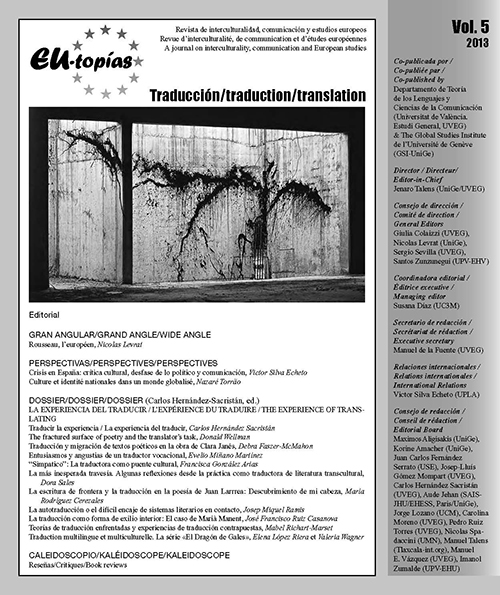The fractured surface of poetry and the translator's task
DOI:
https://doi.org/10.7203/eutopias.0.19784Palabras clave:
Traducción, poesía, «close reading», expresión fracturada Resumen
Resumen
Toda traducción es parcial. Capta a lo sumo contenidos inherentes al texto original. Esto es especialmente así en la traducción de poesía. La traducción fractura ese vínculo entre forma de expresión y contenido que distingue a la poesía de otros usos del lenguaje. Aplico este principio a varios ejemplos extraídos de mis traducciones de las obras de Antonio Gamoneda y Emilio Prados. Mis traducciones aproximan quizá algunas cualidades del original, pero no pueden competir con la integridad de los textos fuente. Argumento también que la traducción ofrece una posición única para la ‘close reading’, lo que tiene también su paralelismo en el estudio de poesía experimental o de vanguardia como la de John Ashbery o Charles Bernstein. Esta dinámica de «close reading» ve duplicados su fuerza y valor cuando traducimos textos innovadores llevándolos así de la lengua en que se crearon a la lengua que los hospeda.
 Descargas
Descargas
 Citas
Citas
AGAMBEN, Giorgio, Lorenzo CHIESA and Matteo MANDARINI (2011), The Kingdom and the Glory: For a Theological Genealogy of Economy and Government, Palo Alto: Stanford University Press.
ALMOND, Ian (2002), «Different Fragments, Different Vases: a Neoplatonic Commentary on Benjamin’s’ The Task of the Translator», Heythrop Journal, XLIII, pp. 185-198.
ASHBERY, John (2010), El Juramento de la pista de frontón: The tennis court oath, bilingual edition, trans. Julio Mas Alcaraz, Barcelona: Calambur.
BARGLOW, Raymond (1998), «The Angel of History: Walter Benjamin’s Vision of Hope and Despair», Tikkun Magazine, November 1998, http://www.barglow.com/angel_of_history.htm
BENJAMIN, Walter (1968), «The Task of the Translator», in Illuminations, trans. Harry Zohn, New York: Schocken, pp. 69-82
BENJAMIN, Walter (1997), «The Translator’s Task», TTR (Traduction, Terminologie, Rédaction), 10 (2), pp. 151-165, trans. Steven Rendall, http://id.erudit.org/iderudit/037302ar. Also available in Lawrence Venuti, ed. (2012), The Translation Studies Reader, 3rd ed., London: Routledge.
BENJAMIN, Walter (1968), «Theses on the Philosophy of History», in Illuminations, trans. Harry Zohn, New York: Schocken, pp. 253-264.
BERNSTEIN, Charles (libretto) and Brian Ferneyhough (music) (2005), Shadowtime, Los Angeles: Green Integer.
BERNSTEIN, Charles (1992), «Artifice of Absorption», in A Poetics, Cambridge: Harvard University Press, pp. 9-89.
CATULLUS, Gaius Valerius, [Works,] in Catullus, Tibullus, and Pervergilium Veneris, F. W. Cornish, et al., translators, second edition, revised by G.P. Goold, Loeb Classical Library, Cambridge: Harvard University Press and London: Heinemann, [1913] 1988, 62.
EASTMAN, Andrew (2009), «Estranging the Classic: The Zukofskys’ Catullus», Revue LISA/LISA e-journal [Online], Vol. VII – n°2 | 2009, Online since 02 June 2009, connection on 20 August 2012. http://lisa.revues.org/312
GAMONEDA, Antonio (2004), Libro del frío in Esta luz: poesía reunida (1947-2004).Barcelona: Galaxia Gutenberg / Círculo de Lectores.
PRADOS, Emilio (1999), Poesías completas. Madrid: Visor.
SCHOLEM, Gershom (1923), Das Buch Bahir. Volume 1 of Quellen und Forschungen zur Geschichte der jüdischen Mystik. Editor, Robert Eisler. Drugelin.
SMITH, Dan (1997), Introduction to Gilles Deleuze, Essays Critical and Clinical, Minneapolis: University of Minnesota Press, pp. xi-liii.
STEVENS, Wallace (1997), Collected Poetry and Prose, New York: Library of America.
VENUTI, Lawrence (1995), The Translator’s Invisibility. A History of Translation, London: Routledge.
WELLMAN, Donald (2010), A North Atlantic Wall. Loveland: Dos Madres.
ZUKOFSKY, Celia and Louis, translators (1969), Catullus (Gai Valeri Catulli Veronensis Liber). London: Cap Golliard.
ZUKOFSKY, Louis (1987), Bottom on Shakespeare, Berkeley: University of California Press, c1963.
Descargas
Publicado
Cómo citar
-
Resumen149
-
PDF 57
Número
Sección
Licencia
![]()
Las personas autores conservan los derechos de autor/a. Todos los contenidos publicados en EU-topías. Revista de interculturalidad, comunicación y estudios europeos están sujetos a la licencia Creative Commons Reconocimento-NoComercia-Compartirigual 4.0 cuyo texto completo puede consultar en <http://creativecommons.org/licenses/by-nc-sa/4.0>
Se pueden copiar, usar, difundir, transmitir y exponer públicamente, siempre que:
- Se cite la autoría y la fuente original de su publicación (revista, editorial y URL de la obra).
- No se usen para fines comerciales.
- Se mencione la existencia y especificaciones de esta licencia de uso.
Es responsabilidad de los autores y las autoras obtener los permisos necesarios de las imágenes que están sujetas a derechos de autor.



